2 dec 2017
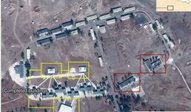
Israeli planes struck a military base being built by Iranian military forces, near the Syrian capital of Damascus, with surface-to-air missiles, pro-Assad news outlets reported early on Saturday morning.
The strikes were carried out from Lebanese airspace, the reports said, and hit near the city of Al-Kiswa, located some 13 kilometers south of Damascus. Loud explosions reportedly followed, according to the PNN.
Earlier on Friday, Hezbollah’s Al-Manar TV channel reported that Israeli planes flew over southern Lebanon.
Syria’s air-defense system fired missiles at the Israeli aircrafts, Sky News Arabia reported.
The Syrian government has yet to comment on the reports.
According to the Syrian Observatory for Human Rights, an organization affiliated with the country’s opposition, heavy explosions were heard in the Damascus area, while electricity was cut off in several parts of the city.
Israeli officials declined to comment on the reports.
Earlier this month, the BBC reported that Iran is building a permanent military base in Syria, within a compound used by the Syrian military near Al-Kiswa.
The strikes were carried out from Lebanese airspace, the reports said, and hit near the city of Al-Kiswa, located some 13 kilometers south of Damascus. Loud explosions reportedly followed, according to the PNN.
Earlier on Friday, Hezbollah’s Al-Manar TV channel reported that Israeli planes flew over southern Lebanon.
Syria’s air-defense system fired missiles at the Israeli aircrafts, Sky News Arabia reported.
The Syrian government has yet to comment on the reports.
According to the Syrian Observatory for Human Rights, an organization affiliated with the country’s opposition, heavy explosions were heard in the Damascus area, while electricity was cut off in several parts of the city.
Israeli officials declined to comment on the reports.
Earlier this month, the BBC reported that Iran is building a permanent military base in Syria, within a compound used by the Syrian military near Al-Kiswa.
29 nov 2017
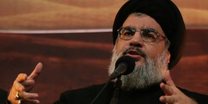
Amid rising tension and Israeli threats of a new war against Lebanon, Israel has reportedly threatened that Hassan Nasrallah, the head of Lebanon’s resistance movement, will be a target of assassination in its next war.
The Israeli military’s chief spokesman, Ronen Manelis, said on Monday, “We are also active in this theater, and it is an operational theater in every respect.
Just in the past few weeks, we’ve taken a great many actions that caused consternation on the other side.” He added, according to the PNN: “There won’t be a clear victory picture in the next war, though it’s clear that Nasrallah is a target.”
Intelligence and operational capabilities and firepower will determine that, if it is difficult in Israel, it will be much more difficult in Lebanon.
The Israeli military’s chief spokesman, Ronen Manelis, said on Monday, “We are also active in this theater, and it is an operational theater in every respect.
Just in the past few weeks, we’ve taken a great many actions that caused consternation on the other side.” He added, according to the PNN: “There won’t be a clear victory picture in the next war, though it’s clear that Nasrallah is a target.”
Intelligence and operational capabilities and firepower will determine that, if it is difficult in Israel, it will be much more difficult in Lebanon.
22 sept 2017

In September of each year Palestinians recall the egregious massacres committed against them in Lebanon in 1982 which claimed the lives of thousands of civilians.
In his testimony, published by the US "Nation Magazine", the Palestinian historian, Rashid Khalidi, shed light on Washington's involvement in the massacres.
The report noted that the US had a prior knowledge of what the Israeli troops intended to do, adding that when the US special envoy, Morris Draper, met the Israeli criminal who led the operations, Ariel Sharon, the latter told him that he would kill everyone and that no-one would be left to live.
The US responsibility is not just a matter of having a prior knowledge or supplying the Israeli forces with lethal weapons, according to Khalidi who affirmed that the massacres started after US gave the green light for the onslaught.
It was the US, through its foreign ministry, who pushed Palestinians, represented by the Palestine Liberation Organization (PLO), for ceasefire talks and made guarantees for their safety. Sabra and Shatila massacres took place less than a month after that.
An official memo sent by the US administration on 5th August 1982 to the Lebanese government and the PLO said, "Law-abiding Palestinian non-combatants remaining in Beirut will be authorized to live in peace and security. The Lebanese and US governments will provide appropriate security guarantees."
The report was concluded by saying that the US continues to this day to offer blind support for the Israeli occupation costing the lives of tens of thousands of Palestinians.
In his testimony, published by the US "Nation Magazine", the Palestinian historian, Rashid Khalidi, shed light on Washington's involvement in the massacres.
The report noted that the US had a prior knowledge of what the Israeli troops intended to do, adding that when the US special envoy, Morris Draper, met the Israeli criminal who led the operations, Ariel Sharon, the latter told him that he would kill everyone and that no-one would be left to live.
The US responsibility is not just a matter of having a prior knowledge or supplying the Israeli forces with lethal weapons, according to Khalidi who affirmed that the massacres started after US gave the green light for the onslaught.
It was the US, through its foreign ministry, who pushed Palestinians, represented by the Palestine Liberation Organization (PLO), for ceasefire talks and made guarantees for their safety. Sabra and Shatila massacres took place less than a month after that.
An official memo sent by the US administration on 5th August 1982 to the Lebanese government and the PLO said, "Law-abiding Palestinian non-combatants remaining in Beirut will be authorized to live in peace and security. The Lebanese and US governments will provide appropriate security guarantees."
The report was concluded by saying that the US continues to this day to offer blind support for the Israeli occupation costing the lives of tens of thousands of Palestinians.
13 sept 2017

By Emma Von Larsen and Bettina Boye/PNN
Various Israeli officials joined the IDC institute of Counterterrorism annual conference to discuss the development of terrorism and ways to counter, where Israeli minister of education, Naftali Bennett emphasized that “modern Zionism has created a safe haven for Jewish people, and Iran threatens this” and continued “I have no doubt that the nuclearization of Iran is the number one existential threat to the state of Israel”.
He claimed that an attack on Iran would not destroy the country, but an attack by Iran on Israel would, and that is a great threat for Israel.
Despite the lack of an actual war between Israel and Iran and Israel’s recent bombing of an alleged weapon factory in Syria, which could be seen as provoking and as an invitation to a proxy war with Iran, Bennett underlines, that the tension between the two countries is not a “Cold War”.
Bennett also argued that Israel’s own policy of disengagement is one of the greatest threats towards itself, and mentions as an example the 2005 disengagement from the conflict in Gaza, and that the consequences of Israel’s disengagement was the takeover of the Strip by Hamas.
As another example of Israel’s policy of disengagement, Bennett mentions the situation with Hezbollah, and states that, when the Israeli military retreaded from the position in Lebanon they indirectly allowed Hezbollah to blossom and to grow strength.
“I would like to state this emphatically: Lebanon is Hezbollah and Hezbollah is Lebanon. A ballistic attack on Israel would be the equivalent of a declaration of war by sovereign state of Lebanon,” he said.
Various Israeli officials joined the IDC institute of Counterterrorism annual conference to discuss the development of terrorism and ways to counter, where Israeli minister of education, Naftali Bennett emphasized that “modern Zionism has created a safe haven for Jewish people, and Iran threatens this” and continued “I have no doubt that the nuclearization of Iran is the number one existential threat to the state of Israel”.
He claimed that an attack on Iran would not destroy the country, but an attack by Iran on Israel would, and that is a great threat for Israel.
Despite the lack of an actual war between Israel and Iran and Israel’s recent bombing of an alleged weapon factory in Syria, which could be seen as provoking and as an invitation to a proxy war with Iran, Bennett underlines, that the tension between the two countries is not a “Cold War”.
Bennett also argued that Israel’s own policy of disengagement is one of the greatest threats towards itself, and mentions as an example the 2005 disengagement from the conflict in Gaza, and that the consequences of Israel’s disengagement was the takeover of the Strip by Hamas.
As another example of Israel’s policy of disengagement, Bennett mentions the situation with Hezbollah, and states that, when the Israeli military retreaded from the position in Lebanon they indirectly allowed Hezbollah to blossom and to grow strength.
“I would like to state this emphatically: Lebanon is Hezbollah and Hezbollah is Lebanon. A ballistic attack on Israel would be the equivalent of a declaration of war by sovereign state of Lebanon,” he said.
5 sept 2017
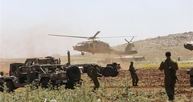
Israeli Channel Two reported that Israeli army began on Tuesday a massive exercise simulating conflict with Hezbollah along the Lebanon border in what would be the largest drill in nearly two decades.
The drill will last for 10 days and simulate "scenarios we'll be facing in the next confrontation with Hezbollah", an army source said on Monday.
Military sources said that tens of thousands of soldiers, including reserves, would take part. Aircraft, boats and submarines would be deployed, and the army's canine unit would also participate in the drill, they said.
Israel has voiced growing concerns about Iran's buildup in neighboring Syria and Hezbollah's stockpiling of weapons in southern Lebanon.
Preparations for the drill, however, have been ongoing for more than a year and a half, the sources pointed out.
The drill will last for 10 days and simulate "scenarios we'll be facing in the next confrontation with Hezbollah", an army source said on Monday.
Military sources said that tens of thousands of soldiers, including reserves, would take part. Aircraft, boats and submarines would be deployed, and the army's canine unit would also participate in the drill, they said.
Israel has voiced growing concerns about Iran's buildup in neighboring Syria and Hezbollah's stockpiling of weapons in southern Lebanon.
Preparations for the drill, however, have been ongoing for more than a year and a half, the sources pointed out.
24 june 2017
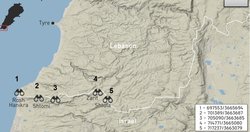
A list of positions in Lebanon that Israel revealed to the UN, claiming each point was a covert Hezbollah station
United Nations peacekeeping force in Lebanon denies Israel claim that Hezbollah is using environmental group as guise to set up observation stations along Israel-Lebanon border.
The UN peacekeeping force on Lebanon's border with Israel has not seen any violations of the UN-brokered cease-fire that ended a war with the Lebanese militant group Hezbollah in 2006, as Israel claims, the UN said Friday.
Israel filed a complaint Tuesday with the UN Security Council accusing Hezbollah of setting up observation outposts along the border on land purportedly used by an environmental advocacy group called Green Without Borders.
UN Spokeswoman Eri Kaneko told reporters that over the last two years, the UN force known as UNIFIL "has observed tree-planting activities undertaken by the NGO as is their stated objective."
"UNIFIL has not observed any unauthorized armed persons at the location or found any basis to report a violation of the (cease-fire) resolution," she said.
Kaneko said UNIFIL remains in contact with Lebanese armed forces on monitoring the border to ensure there are no violations "and to avoid any misunderstandings or tensions that could endanger the cessation of hostilities."
She said "UNIFIL remains vigilant and continues to monitor the Blue Line," the UN-drawn boundary between Lebanon and Israel.
The Israeli military on Thursday released photos and video of what it said were the Hezbollah observation posts. One video showed a pair of uniformed men climbing onto a watchtower on spots Israel says are used by Green Without Borders.
Israel said the environmental group has received funding in the past from Hezbollah.
Kaneko said UNIFIL, in cooperation with Lebanon's armed forces, "closely monitors all activities close to the Blue Line."
She noted that in accordance with its mandate, "UNIFIL cannot and does not enter private property unless there is credible evidence of a violation" of the cease-fire resolution "or an imminent threat of physical violence emanating from that specific location."
The 2006 Israel-Hezbollah war ended in a stalemate.
Hezbollah, an Iranian-backed Shiite group, has since built up an arsenal that is now believed to include well over 100,000 missiles and rockets aimed at Israel. In recent years, it has suffered heavy losses backing up the forces of President Bashar al-Assad in the Syrian civil war.
United Nations peacekeeping force in Lebanon denies Israel claim that Hezbollah is using environmental group as guise to set up observation stations along Israel-Lebanon border.
The UN peacekeeping force on Lebanon's border with Israel has not seen any violations of the UN-brokered cease-fire that ended a war with the Lebanese militant group Hezbollah in 2006, as Israel claims, the UN said Friday.
Israel filed a complaint Tuesday with the UN Security Council accusing Hezbollah of setting up observation outposts along the border on land purportedly used by an environmental advocacy group called Green Without Borders.
UN Spokeswoman Eri Kaneko told reporters that over the last two years, the UN force known as UNIFIL "has observed tree-planting activities undertaken by the NGO as is their stated objective."
"UNIFIL has not observed any unauthorized armed persons at the location or found any basis to report a violation of the (cease-fire) resolution," she said.
Kaneko said UNIFIL remains in contact with Lebanese armed forces on monitoring the border to ensure there are no violations "and to avoid any misunderstandings or tensions that could endanger the cessation of hostilities."
She said "UNIFIL remains vigilant and continues to monitor the Blue Line," the UN-drawn boundary between Lebanon and Israel.
The Israeli military on Thursday released photos and video of what it said were the Hezbollah observation posts. One video showed a pair of uniformed men climbing onto a watchtower on spots Israel says are used by Green Without Borders.
Israel said the environmental group has received funding in the past from Hezbollah.
Kaneko said UNIFIL, in cooperation with Lebanon's armed forces, "closely monitors all activities close to the Blue Line."
She noted that in accordance with its mandate, "UNIFIL cannot and does not enter private property unless there is credible evidence of a violation" of the cease-fire resolution "or an imminent threat of physical violence emanating from that specific location."
The 2006 Israel-Hezbollah war ended in a stalemate.
Hezbollah, an Iranian-backed Shiite group, has since built up an arsenal that is now believed to include well over 100,000 missiles and rockets aimed at Israel. In recent years, it has suffered heavy losses backing up the forces of President Bashar al-Assad in the Syrian civil war.
27 may 2017
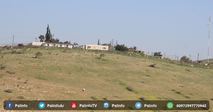
A number of gunboats belonging to the Israeli enemy violated on Thursday and Friday the Lebanese territorial waters off Ras Naqoura, while an Israeli drone violated on Friday the Lebanese airspace, an official in the Lebanese army revealed.
Eight Israeli gunboats violated the Lebanese territorial waters off Ras Naqoura, and infiltrated some 445 meters into the sea, the army sources explained.
Meanwhile, an Israeli reconnaissance aircraft violated the Lebanese airspace over the southern town of Alma el-Shaeb on Friday evening, circled over Beirut and its suburbs and then left flying over the Rmeish town, a Lebanese army communique said.
It added that the violations will be discussed and followed up with the UNIFIL.
Eight Israeli gunboats violated the Lebanese territorial waters off Ras Naqoura, and infiltrated some 445 meters into the sea, the army sources explained.
Meanwhile, an Israeli reconnaissance aircraft violated the Lebanese airspace over the southern town of Alma el-Shaeb on Friday evening, circled over Beirut and its suburbs and then left flying over the Rmeish town, a Lebanese army communique said.
It added that the violations will be discussed and followed up with the UNIFIL.
5 feb 2017
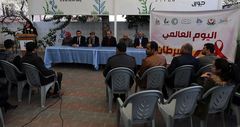
The Lebanese police on Saturday ordered dozens of Palestinian families seeking shelter in southern Lebanon to evacuate their homes, pending their demolition.
According to Palestinian sources, the Lebanese authorities issued orders to evacuate 50 homes housing Palestinian refugee families al-Qasimiya community, to the north of the southern Lebanese city of Tyre (Sour).
Established over 50 years ago, following the mass-deportation of the Palestinians on the eve of the 1848 Nakba, the al-Qasimiya community has been a home to 6,000 Palestinian refugees, mostly working in the agricultural field.
Recently, the refugees thwarted an attempt by Lebanon’s al-Abassiya municipality to knock down Palestinian homes to expand the Sidon highway.
Thabet Organization for the Right of Return dubbed the developments signs of “a new humanitarian crisis endured by the Palestinian community in Lebanon.”
Thabet called for an urgent action as regards underway attempts to dislocate al-Shabriha community in favor of the Sidon highway.
The refugees voiced their support for ongoing projects to develop infrastructure in southern Lebanon on condition that they do not result in mass-deportation of the Palestinians.
The refugees urged the Lebanese government to work out the crisis and to build alternative homes to the west of the highway.
They further called on the international human rights institutions, namely UNRWA, and the mass media to take up their responsibilities regarding the affair.
According to Palestinian sources, the Lebanese authorities issued orders to evacuate 50 homes housing Palestinian refugee families al-Qasimiya community, to the north of the southern Lebanese city of Tyre (Sour).
Established over 50 years ago, following the mass-deportation of the Palestinians on the eve of the 1848 Nakba, the al-Qasimiya community has been a home to 6,000 Palestinian refugees, mostly working in the agricultural field.
Recently, the refugees thwarted an attempt by Lebanon’s al-Abassiya municipality to knock down Palestinian homes to expand the Sidon highway.
Thabet Organization for the Right of Return dubbed the developments signs of “a new humanitarian crisis endured by the Palestinian community in Lebanon.”
Thabet called for an urgent action as regards underway attempts to dislocate al-Shabriha community in favor of the Sidon highway.
The refugees voiced their support for ongoing projects to develop infrastructure in southern Lebanon on condition that they do not result in mass-deportation of the Palestinians.
The refugees urged the Lebanese government to work out the crisis and to build alternative homes to the west of the highway.
They further called on the international human rights institutions, namely UNRWA, and the mass media to take up their responsibilities regarding the affair.
29 jan 2017

An official at the Palestinian embassy in Lebanon was injured on Sunday evening after being shot while riding his car in the southern Lebanese city of Sidon.
The National New Agency identified the official who was attacked as Brigadier Ismail Sharouf.
According to the news agency, Sharouf's car was exposed to a hail of bullets, one of which pierced the windshield injuring him slightly. Sharouf was taken to a hospital in Sidon, but the Palestinian embassy requested moving him to Beirut under Lebanese security escort.
A Palestinian security source affirmed that Sharouf sustained minor injuries and that he is recovering and will leave hospital soon.
It warned that this attack seeks to drag Palestinians in Lebanon into chaos and internal struggle.
The National New Agency identified the official who was attacked as Brigadier Ismail Sharouf.
According to the news agency, Sharouf's car was exposed to a hail of bullets, one of which pierced the windshield injuring him slightly. Sharouf was taken to a hospital in Sidon, but the Palestinian embassy requested moving him to Beirut under Lebanese security escort.
A Palestinian security source affirmed that Sharouf sustained minor injuries and that he is recovering and will leave hospital soon.
It warned that this attack seeks to drag Palestinians in Lebanon into chaos and internal struggle.
16 jan 2017
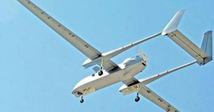
An Israeli reconnaissance drone crashed Monday evening south of Lebanon, the Lebanese National News Agency correspondent reported.
The incident promoted the Lebanese Armed Forces and the UNIFIL to dispatch patrols in search for the jet, the sources added.
However, the dispatched teams have thus far failed to reach the sought area due to the steep land in the region.
Meanwhile, Israeli troops were seen mobilizing off the aforementioned area, amid intensive flights of Israeli reconnaissance planes and choppers.
Last week, two Israeli warplanes violated the Lebanese airspace over Kfarkila, and effectuated circular flights off the different Lebanese regions.
The incident promoted the Lebanese Armed Forces and the UNIFIL to dispatch patrols in search for the jet, the sources added.
However, the dispatched teams have thus far failed to reach the sought area due to the steep land in the region.
Meanwhile, Israeli troops were seen mobilizing off the aforementioned area, amid intensive flights of Israeli reconnaissance planes and choppers.
Last week, two Israeli warplanes violated the Lebanese airspace over Kfarkila, and effectuated circular flights off the different Lebanese regions.
7 jan 2017
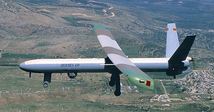
An Israeli M.K drone crossed Saturday the Lebanese airspace in flagrant violation of the UN Security Council 1701 resolution (2006).
An Israeli pilotless reconnaissance "MK" drone breached on Saturday Lebanese airspace off the districts of Tyre and Bint Jbeil, the Lebanese National News Agency Correspondent said on Saturday.
The incident came few hours after the UNIFIL indicated that it was notified by the Israeli army that it has captured a Lebanese shepherd who had allegedly crossed the Blue Line in the vicinity of Aita al-Shaab in the South.
The UNIFIL also indicated that "the head of the UNIFIL mission and its General Commander, Major General Michael Perry, as well as the UNIFIL correlation team are in touch with the parties concerned in this regard, focusing their efforts on securing the shepherd's release."
UN Security Council Resolution 1701, which brokered a ceasefire in the war of aggression Israel launched against Lebanon in 2006, calls on Israel to respect Lebanon's sovereignty and territorial integrity.
An Israeli pilotless reconnaissance "MK" drone breached on Saturday Lebanese airspace off the districts of Tyre and Bint Jbeil, the Lebanese National News Agency Correspondent said on Saturday.
The incident came few hours after the UNIFIL indicated that it was notified by the Israeli army that it has captured a Lebanese shepherd who had allegedly crossed the Blue Line in the vicinity of Aita al-Shaab in the South.
The UNIFIL also indicated that "the head of the UNIFIL mission and its General Commander, Major General Michael Perry, as well as the UNIFIL correlation team are in touch with the parties concerned in this regard, focusing their efforts on securing the shepherd's release."
UN Security Council Resolution 1701, which brokered a ceasefire in the war of aggression Israel launched against Lebanon in 2006, calls on Israel to respect Lebanon's sovereignty and territorial integrity.
3 jan 2017
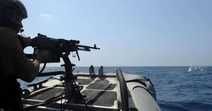
Israeli naval forces opened fire Monday on a Lebanese fishing boat off the coast of Naqoura, in south Lebanon, the Lebanese army said in a statement.
The sources said that it had no knowledge of any injuries.
The statement added that the matter is being closely followed in collaboration with the United Nations Interim Force in Lebanon (UNIFIL).
The attack came as part of Israeli frequent violations of the U.N. Security Council Resolution 1701, which formally ended the 2006 war between Israel and Lebanon.
The sources said that it had no knowledge of any injuries.
The statement added that the matter is being closely followed in collaboration with the United Nations Interim Force in Lebanon (UNIFIL).
The attack came as part of Israeli frequent violations of the U.N. Security Council Resolution 1701, which formally ended the 2006 war between Israel and Lebanon.
